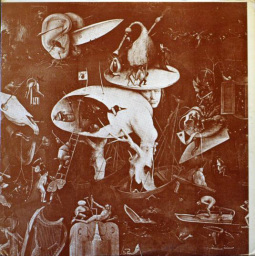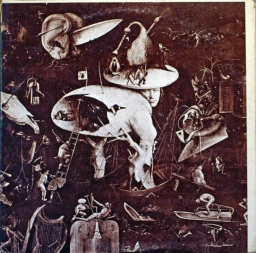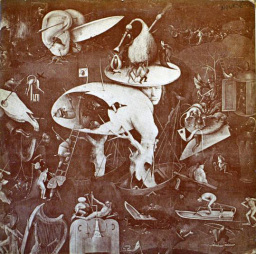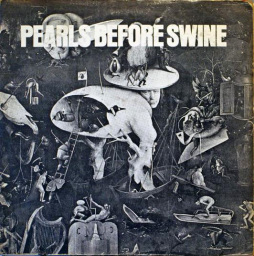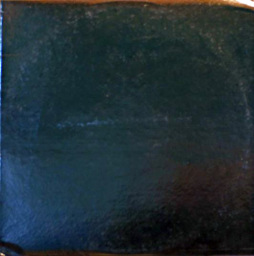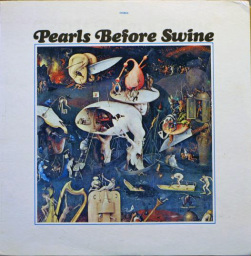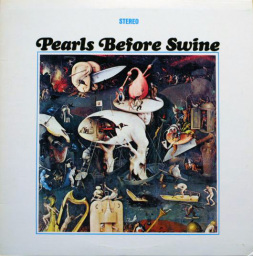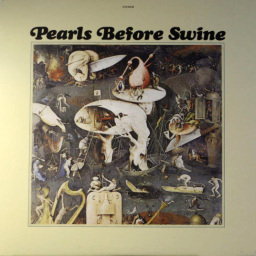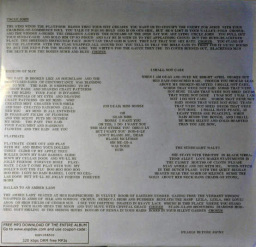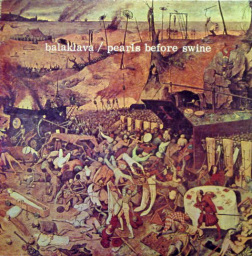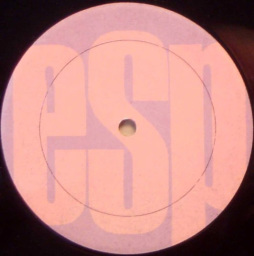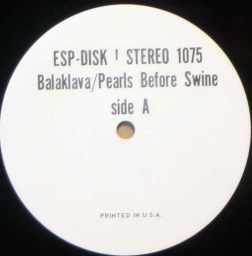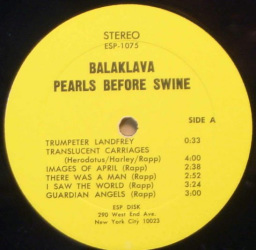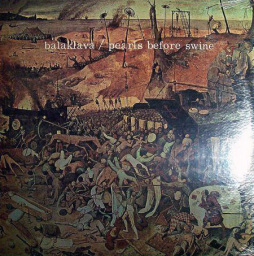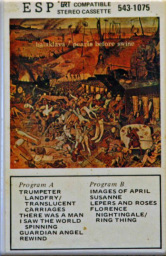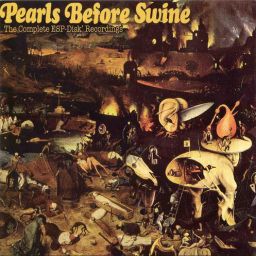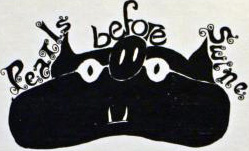
 |
Pearls Before Swine (
Tom Rapp ) ESP-Disk'
|
 |
|
156 Fifth Avenue, NY NY 10010
MONO
156 Fifth Avenue, NY NY 10010
STEREO
156 Fifth Avenue, NY NY 10010
MONO?
156 Fifth Avenue, NY NY 10010
MONO?
156 Fifth Avenue, NY NY 10010
MONO
156 Fifth Avenue, NY NY 10010
STEREO
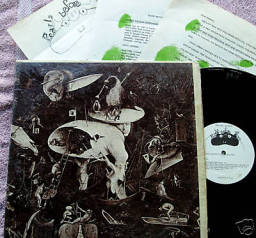 |
PEARLS BEFORE SWINE,
"One Nation Underground", original pressing folk-psych rock lp on ESP-1054,
stereo... Included are the hard to find 3 page promo package signed by general
manager and ESP owner..... |
Test Pressing
156 Fifth Avenue, NY NY 10010
STEREO
290 West End Ave, NY NY 10023
STEREO
ESP-Disk' New LP
One Nation
Underground (Pearls Before Swine album)
Nation Underground was the debut album by
American psychedelic folk group
Pearls Before
Swine. It was released on the ESP-Disk label in
1967.
It was recorded at Impact Sound in New York
City, between May 6-9, 1967, by the Florida-based group, which at that point
comprised main songwriter and singer Tom Rapp, Wayne Harley, Lane
Lederer, and Roger Crissinger. Percussion was by session musician Warren
Smith.
The album presents a mixture of styles - "psychedelic
folk reminiscent of Donovan collides with
Farfisa-driven punk and hard-to-categorize repetitive minimalism, all thrown
together with the undisciplined, creative exuberance of youth".[2]
"Another Time" is an acoustic song, the first that Rapp
ever wrote, based on his experience in a car crash where he walked away
unscathed, and, with "Morning Song", represents the most characteristic example
of Rapp's later writing style. In contrast, "Drop Out !" and "Uncle John" are
youthful protest songs. "(Oh Dear) Miss Morse" spells out in Morse code
the word F-U-C-K, accompanied by banjo and organ.
The album became the most successful ESP release ever,
estimated to have sold between 100,000 and 250,000 copies. Early vinyl copies
came with a small poster of the Hell panel from Hieronymus Bosch's "Garden Of
Delights", a detail of which was used on the front of the album
sleeve.
The album has been reissued several times on
CD.
Track listing
- "Another Time" - 3:03 (Rapp)
- "Playmate" - 2:19 (Saxie Dowell)
- "Ballad To An Amber Lady" - 5:14 (Crissinger,
Rapp)
- "(Oh Dear) Miss Morse" - 1:54 (Rapp)
- "Drop Out!" - 4:04 (Rapp)
- "Morning Song" - 4:06 (Rapp)
- "Regions Of May" - 3:27 (Rapp)
- "Uncle John" - 2:54 (Rapp)
- "I Shall Not Care" - 5:20 (Teasdale, Roman Tombs,
Rapp)
- "The Surrealist Waltz" - 3:29 (Lederer,
Crissinger)
Musicians
- Tom Rapp: Vocals,
Guitar
- Wayne Harley: Autoharp, Banjo, Mandoline,
Vibraphone, Audio Oscillator, Harmony
- Lane Lederer: Bass, Guitar, English
Horn, Swinehorn, Sarangi, Celeste, Finger Cymbals, Vocals (on "Surrealist
Waltz")
- Roger Crissinger: Organ, Harpsichord, Clavioline
- Warren
Smith: Drums, Percussion
References
External links
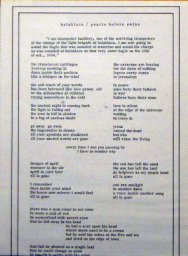 |
156 Fifth Avenue, NY
NY 10010
STEREO |
156 Fifth Avenue, NY NY 10010
STEREO
156 Fifth Avenue, NY NY 10010
STEREO
290 West End Ave, NY NY 10023
STEREO
Test Pressing
Balaklava
(album)
Balaklava was the second album recorded and
released by psychedelic folk group
Pearls Before
Swine, in 1968.
For the album, original group members Tom Rapp, Wayne Harley and Lane
Lederer were joined by Jim Bohannon, who replaced Roger Crissinger. Like the
groupfs previous LP on ESP-Disk, "One
Nation Underground", it was recorded at Impact Sound in New York City.
Recordings probably took place in early 1968 ? although some CD reissues state
that it was recorded in 1965, this appears to be an error. Lederer left the
group during, or shortly after, the recordings, and the basic group was
augmented by studio musicians.
Rapp has stated [1] that he wanted to
produce a themed anti-war album, and chose the Charge of the
Light Brigade at Balaklava in 1854 as an
example of the futility of war. The album was dedicated to Private
Edward Slovik, the only US soldier executed for desertion in the Second
World War. The front cover, a detail of "The Triumph of
Death" by Pieter Brueghel
the Elder, showed a grotesque allegorical depiction of the horrors of war,
while the back cover showed a photograph of a young girl at an anti-war protest.
The cover also included the quote hOnly the dead have seen the end of
warh by George Santayana,
together with surreal and horrific drawings by Jean Cocteau. Incidentally,
the cover contributed to the mystique surrounding the group - there were few if
any photographs of its members published, and Pearls Before Swine did not
perform in concert before 1971.
The album itself starts with a recording of gTrumpeter
Landfreyh (his name was in fact Martin Lanfried) [2]
[3], one of the original
buglers from the 1854 battle. Together
with the recording of Florence
Nightingale later on the album, this was taken from an archive 1890 cylinder
recording, which had been reissued on 78rpm records in the 1930s.
The recording segues into "Translucent Carriages", one of
Rappfs most lasting songs (which he performed, for instance, at the Terrastock 6
Festival in 2006). Simply performed with acoustic guitar, it is rendered
otherworldly by breathing noises and whispered lines of commentary, including
the quote from the ancient Greek historian Herodotus - "In peace, sons
bury their fathers / in war, fathers bury their sons."
"Images of April", in contrast, is an evocation of
nature, featuring dubbed bird song. After "There Was A Man", a simpler
story-based folk song, another highlight is "I Saw The World". Its innocent but
heartfelt lyric (Rapp was just 21 at the time) - "I saw the world spinning
like a toy / Hate seems so small compared to it all, so why donft you do
joy ?" - is supplemented by overdubs of natural sounds including waves, as
well as wind chimes and a lush string arrangement. "Guardian Angels" is a ballad
recorded deliberately to sound as it if it were on a scratchy 1920s 78rpm
record, and was presented as such ("recorded in Guadelope, Mexico, in
1929c" ) on the sleeve.
The generally less artistically successful second side of
the original LP starts with a version of Leonard Cohen's "Suzanne" ,
followed by Rappfs original "Lepers and Roses", a complex ballad full of
allegorical classical references. After the archive recording of Florence
Nightingale, the final track, "Ring Thing", is a dramatic evocation of Tolkien's The Lord of the
Rings with crashing gongs and bagpipe drones. At the end, the sound of a
tape spooling backwards through the album takes the listener back to "Trumpeter
Landfrey" ? the message seeming to be that the cycle of war and confusion is
destined to continue.
The album repeated its predecessorfs critical success on
the underground college scene of the late 1960s, and has subsequently been
regularly rated most highly of all Rappfs albums. Following the album's release,
Rapp extricated himself from his ESP contract and signed with Reprise Records. After
seven further albums he retired from music in the mid-1970s to qualify and work
as a lawyer, returning to perform and record occasionally after the mid-1990s.
Balaklava has been reissued several times on CD since the
1980s.
Track listing
- "Trumpeter Landfrey" ? 0:35
- "Translucent Carriages" ? 4:00
(Herodotus/Harley/Rapp)
- "Images of April" ? 2:44 (Rapp)
- "There Was a Man" ? 2:59 (Rapp)
- "I Saw the World" ? 3:28 (Rapp)
- "Guardian Angels" ? 3:02 (Rapp)
- "Suzanne" ?
5:01 (Cohen)
- "Lepers And Roses" ? 5:23 (Rapp)
- "Florence Nightingale" ? 0:17
- "Ring Thing" ? 2:20 (Tolkien/Rapp)
Credits
- Tom Rapp ? guitar, vocals,
breathing
- Jim Bohannon ? organ, piano, clavinette, marimba
- Wayne Harley ? banjo, harmony
- Lane Lederer ? bass, guitar, swinehorn
- Guest artists :-
- Joe Farrell ? flute, English
horn (tracks 3, 7)
- Lee Crabtree ? piano, organ, flute (tracks 5, 8)
- Bill Salter ? bass (tracks 5, 7, 8, 10)
- Al Shackman ? guitar (track 8)
- Warren Smith ? string arrangements (track 5)
- Selwart Clarke ? string arrangements (track 6)
- Arielvaced out of Onlyville by Richard L. Alderson,
Impact Sound, N.Y.C.
- We wish to dedicate this album to Pvt. Edward D.
Slovik, U.S. Army, deceased
References
- ^ Tom Rapp
- ^ Florence Nightingale remastered
- ^ Internet Archive: Details: Trumpeter Landfrey's Charge of the Light
Brigade
External links
Label:
Catalog#:
ESP 4003
Format:
CD, Compilation
Country:
US
Released:
2005
Genre:
Rock
Style:
Folk Rock, Psychedelic Rock
Tracklist
Autoharp,
Mandolin, Vibraphone, Performer [Audio Oscillator] - Wayne Harley (tracks: 1 to
10)
Banjo, Vocals [Harmony] - Wayne Harley
Bass - Bill
Salter* (tracks: 15, 17, 18, 20)
Bass, Guitar,
Performer [Swinehorn] - Lane Lederer
Drums, Percussion - Warren Smith (tracks: 1 to
10)
Engineer, Edited By, Remastered By - Joe Phillips (3)
English Horn, Sarangi, Celesta, Cymbal [Finger
Cymbals] - Lane
Lederer (tracks: 1 to 10)
Guitar, Vocals - Tom Rapp
Organ, Harpsichord, Keyboards [Clavoline] - Roger Crissinger
(tracks: 1 to 10)
Organ, Piano, Clavinet [Clavinette],
Marimba - Jim
Bohannon (tracks: 11 to 20)
Producer, Engineer -
Richard
L. Alderson*
Vocals [Breathing] - Tom Rapp (tracks: 11 to 20)
Vocals [Harmony] - Swine Chorus (tracks: 1 to
10)
Written-By - Rapp* (tracks: 1, 4
to 8, 13 to 16, 18)
Notes
One Nation Underground and
Balaklava
Originally released as ESP 1054 (tracks 1 to 10) and ESP 1075
(tracks 11 to 20).
Recorded at IMPACT Sound Studios in N.Y.C., May 6-9, 1967
(tracks 1 to 10) and 1968 (tracks 11 to 20).
Reissue production,
engineering, editing and mastering:
Joe Phillips, WildCat Recording USA,
Massena NY


